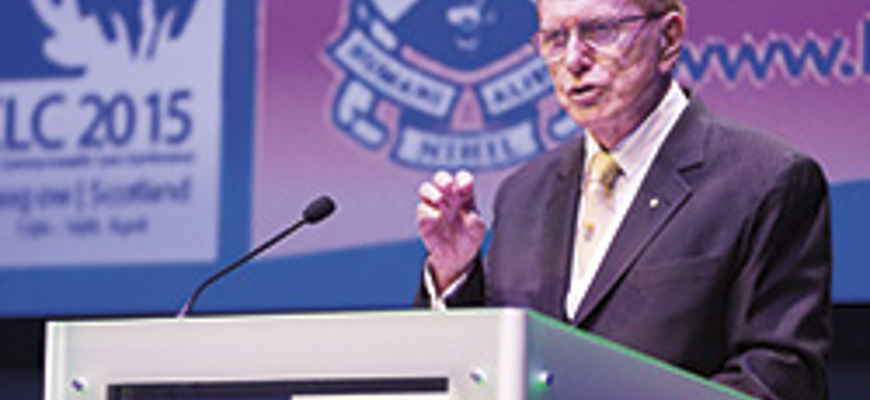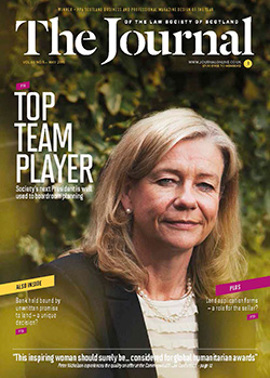A man for all reasons

"There the common sense of most shall hold a fretful realm in awe, And the kindly earth shall slumber, lapt in universal law." (Alfred, Lord Tennyson)
Very occasionally, if you are lucky, you catch a glimpse of greatness. In the final moments of the Commonwealth Lawyers Association Conference, described elsewhere in this issue, I was lucky.
For an hour, I had listened to a keynote address by the eminent Australian jurist and academic, Judge Michael Kirby. Quietly and forensically, quoting the words above from Tennyson’s “Locksley Hall”, he eviscerated the timid record on human rights of the Commonwealth’s Secretary General, Kamalesh Sharma. Having looked at various examples of Sharma’s failure to tackle abuse by member states, he turned to the persecution and worse suffered by LGBT communities in many of them, much of it officially sanctioned. He spoke movingly and openly as a gay man himself.
Judge Kirby sat down to prolonged applause, and questions were invited. A Nigerian delegate rose. He addressed the judge aggressively on his advocacy of tolerance and respect for homosexuality. The strength of the Commonwealth, he argued, was that it allowed each member nation to govern itself according to its own cultural values. It was not for others to criticise, far less intervene. He did not use the expression “cultural imperialism”, but clearly that was what he meant. His message was unmistakable: if Nigeria or others want to discriminate against homosexuals, that’s what they will damn well do. It’s none of your business. There was loud applause from fellow Africans as he spoke.
The previous four days had been a celebration of unity and apparently shared values among people of many different cultures, but here laid bare was a deep divide. It would have been easy for Michael Kirby to reply angrily and self-righteously. Many lesser men would have succumbed to the temptation. But he did not.
“I want to thank you,” he said, “for coming forward.” He went on to say that he respected totally the right of this delegate and his supporters to feel as they did, even though he did not agree. He spoke with great warmth of his love of Nigeria, and the time he had spent there. Spontaneously, he broke into the original Nigerian national anthem, which was taken up enthusiastically by the audience. But then he cut to the heart of the matter. He spoke first of the relationship of 46 years he had enjoyed with his partner. It was inconceivable to him that the love and joy they shared together was something that should be demeaned or condemned. He then made this most telling point: how sad it was that countries which had so often been the victim of racism could advocate this kind of prejudice, which sprang from the same toxic belief that we should all be the same, a belief, he said, which was “simply not deliverable”. “I hope,” he said gently, “that as you continue to reflect on these issues, what I have said today might impinge upon your thinking.” There were many hardbitten lawyers in the audience who found themselves close to tears, as did I.
Later that day, as I watched one of the televised election debates, it was impossible not to contrast the calm wisdom of this compassionate, distinguished man, with the shouty certainties being vomited into one’s livingroom.
Judge Kirby is no stranger to disagreement. In his career as a High Court judge, he became known as “The Great Dissenter”, so often did he deliver judgments at odds with his colleagues, yet he never lost their respect. A man of deep Christian conviction, he has been outspoken about the prejudice against homosexuality in the Anglican and Catholic churches in Australia.
What he taught us all that day was not just about having the courage of one’s convictions, but maintaining humility, openness and respect for the other’s viewpoint, even in the face of what many might regard as vile provocation.
This is a lesson of universal application. A few columns ago, I wrote about the value of dissent in business and compelling evidence that a characteristic of the most successful organisations is their leaders’ embrace of challenge, provided it is driven by what is best for the enterprise, not self-interest.
So next time you hear in a meeting, or receive in an email, a colleague’s suggestion of such gold-plated inanity that to describe it as tripe would be an insult to tripe, try this: resist the urge to light a flamethrower, and begin your response with, “I’d like to thank you for your extremely interesting view.” You might be surprised to see how much easier it is to “impinge upon their thinking” and bring them round to yours.
In this issue
- Sham marriages v Sham interviews: which is the greater evil?
- A trusts law for the modern era?
- When cash just isn't good enough
- Un voyage en vaut la peine*: SYLA does France
- SYLA ends season on a high
- Appreciation: John Henderson
- Reading for pleasure
- Opinion: Mohammed Sabir
- Book reviews
- Profile
- President's column
- People on the move
- Application forms: should the seller adjust?
- When sharing matters
- After the launch
- Game of strategies
- Broken promises
- Charity legacies: the 10% conundrum
- Another "Whose money?" case
- Barrister barred
- Rearranging the family ties
- Belief in the system
- Living by the code
- The sky's the limit
- Unfinished business
- Law reform roundup
- Appreciation: Joseph Beltrami
- LBTT: what does it mean in practice?
- For those of a certain age
- Claims: trending?
- Ask Ash
- A man for all reasons
- The "TER approach"






